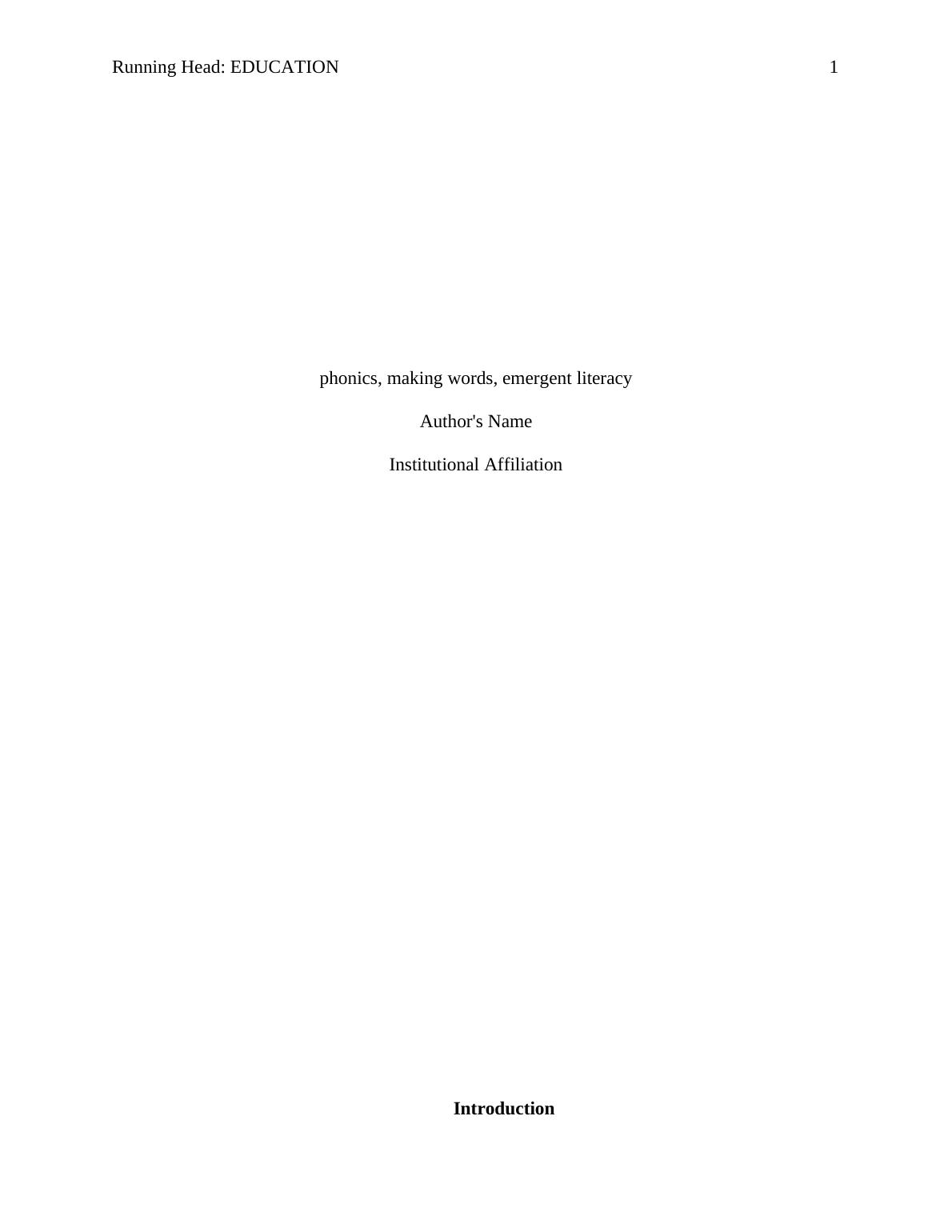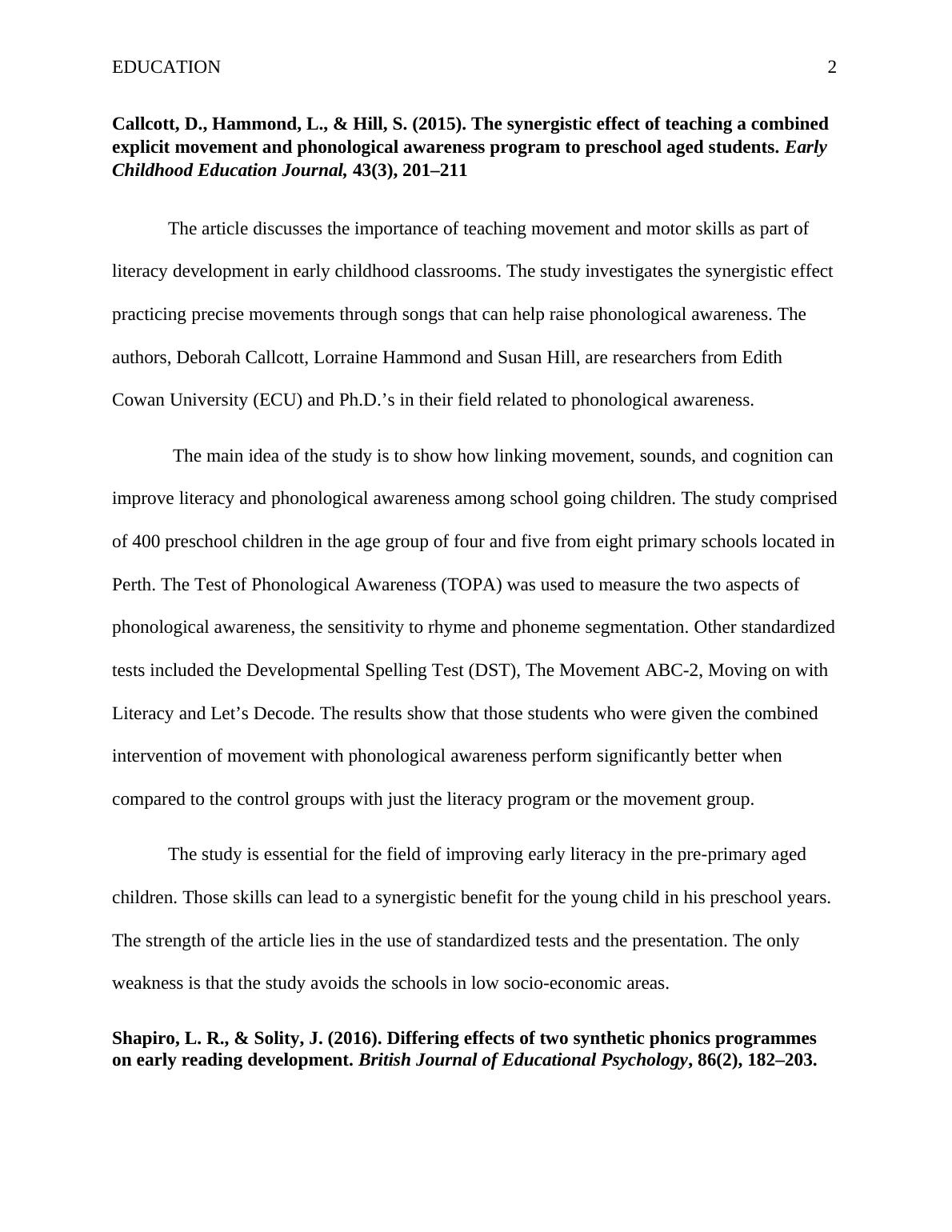Importance of Phonological Awareness in Early Childhood Literacy Development
Added on 2023-06-05
5 Pages908 Words96 Views
Running Head: EDUCATION 1
phonics, making words, emergent literacy
Author's Name
Institutional Affiliation
Introduction
phonics, making words, emergent literacy
Author's Name
Institutional Affiliation
Introduction

EDUCATION 2
Callcott, D., Hammond, L., & Hill, S. (2015). The synergistic effect of teaching a combined
explicit movement and phonological awareness program to preschool aged students. Early
Childhood Education Journal, 43(3), 201–211
The article discusses the importance of teaching movement and motor skills as part of
literacy development in early childhood classrooms. The study investigates the synergistic effect
practicing precise movements through songs that can help raise phonological awareness. The
authors, Deborah Callcott, Lorraine Hammond and Susan Hill, are researchers from Edith
Cowan University (ECU) and Ph.D.’s in their field related to phonological awareness.
The main idea of the study is to show how linking movement, sounds, and cognition can
improve literacy and phonological awareness among school going children. The study comprised
of 400 preschool children in the age group of four and five from eight primary schools located in
Perth. The Test of Phonological Awareness (TOPA) was used to measure the two aspects of
phonological awareness, the sensitivity to rhyme and phoneme segmentation. Other standardized
tests included the Developmental Spelling Test (DST), The Movement ABC-2, Moving on with
Literacy and Let’s Decode. The results show that those students who were given the combined
intervention of movement with phonological awareness perform significantly better when
compared to the control groups with just the literacy program or the movement group.
The study is essential for the field of improving early literacy in the pre-primary aged
children. Those skills can lead to a synergistic benefit for the young child in his preschool years.
The strength of the article lies in the use of standardized tests and the presentation. The only
weakness is that the study avoids the schools in low socio-economic areas.
Shapiro, L. R., & Solity, J. (2016). Differing effects of two synthetic phonics programmes
on early reading development. British Journal of Educational Psychology, 86(2), 182–203.
Callcott, D., Hammond, L., & Hill, S. (2015). The synergistic effect of teaching a combined
explicit movement and phonological awareness program to preschool aged students. Early
Childhood Education Journal, 43(3), 201–211
The article discusses the importance of teaching movement and motor skills as part of
literacy development in early childhood classrooms. The study investigates the synergistic effect
practicing precise movements through songs that can help raise phonological awareness. The
authors, Deborah Callcott, Lorraine Hammond and Susan Hill, are researchers from Edith
Cowan University (ECU) and Ph.D.’s in their field related to phonological awareness.
The main idea of the study is to show how linking movement, sounds, and cognition can
improve literacy and phonological awareness among school going children. The study comprised
of 400 preschool children in the age group of four and five from eight primary schools located in
Perth. The Test of Phonological Awareness (TOPA) was used to measure the two aspects of
phonological awareness, the sensitivity to rhyme and phoneme segmentation. Other standardized
tests included the Developmental Spelling Test (DST), The Movement ABC-2, Moving on with
Literacy and Let’s Decode. The results show that those students who were given the combined
intervention of movement with phonological awareness perform significantly better when
compared to the control groups with just the literacy program or the movement group.
The study is essential for the field of improving early literacy in the pre-primary aged
children. Those skills can lead to a synergistic benefit for the young child in his preschool years.
The strength of the article lies in the use of standardized tests and the presentation. The only
weakness is that the study avoids the schools in low socio-economic areas.
Shapiro, L. R., & Solity, J. (2016). Differing effects of two synthetic phonics programmes
on early reading development. British Journal of Educational Psychology, 86(2), 182–203.

End of preview
Want to access all the pages? Upload your documents or become a member.
